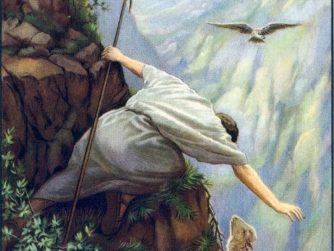Do not be like Jonathan, the son of Saul, who was positioned by God to turn the hearts of the people back to Him in repentance—a man after God’s own heart (1 Samuel 13:14)—yet failed to take a stand for God till the end. Jonathan discerned that his father was the source of Israel’s troubles and He even declared it publicly to his fellow soldiers (co-labourers):
“Then said Jonathan, My father hath troubled the land: see, I pray you, how mine eyes have been enlightened, because I tasted a little of this honey” (1 Samuel 14:29).
Though he recognized the spiritual error of his father, Jonathan remained silent and continued to align with Saul—perhaps out of fear of persecution, family loyalty, or hope of succeeding him as king. In his silence, God’s revelation ceased in his heart. He could have chosen continued fellowship with the company of prophets in Naioth, under the leadership of Samuel at Ramah, where David himself found refuge when he was troubled later in life:
“So David fled, and escaped, and came to Samuel to Ramah, and told him all that Saul had done to him… and he and Samuel went and dwelt in Naioth” (1 Samuel 19:18).
God’s light shone upon Jonathan once more when he encountered David. He loved him as his own soul, and their spirits were knitted together 1 Samuel 18:1. They made a covenant, and Jonathan gave David his robe, garments, sword, bow, and girdle as a symbol of their bond 1 Samuel 18:3–4. Also Jonathan’s prophetic voice was restored. In a profound declaration of spiritual insight and surrender, he said to David:
“And he said unto him, Fear not: for the hand of Saul my father shall not find thee; and thou shalt be king over Israel, and I shall be next unto thee; and that also Saul my father knoweth” (1 Samuel 23:17).

However, these gestures, though noble were not enough. Jonathan should have taken a decisive stand. He ought to have said to David:
“This house is no longer a safe dwelling for you. God has rejected this king and his kingdom” (see 1 Samuel 15:26-27).
He should have urged David:
“Go to Samuel in Ramah, there you will be raised and nurtured further as a disciple. Make room for me also, that I may join the company of young prophets (disicples) there and be marvellously helped by God.”
This was a restoration of spiritual vision—Jonathan recognized God’s hand on David and openly declared it, even though it meant relinquishing his own claim to the throne.
Yet, despite receiving divine revelation, Jonathan did not separate from Saul. He remained attached to his father-in-the-Lord and the prestige of leadership. Instead of following David into the wilderness for discipleship and preparation, or joining him at Naioth under Samuel for spiritual fellowship and prophetic nurture, Jonathan chose to stay within a rejected system (ministry). Perhaps he found more comfort in the familiarity and security of the palace than in the demands of God’s wilderness training. His misplaced loyalty ultimately cost him his life—he died on Mount Gilboa alongside Saul (1 Samuel 31:2), never fully entering the new move of God he once prophetically affirmed.
When you realize that God’s presence has departed from a leader or system, why continue to align with it or encourage others to join? Perhaps Jonathan assumed that once Saul, the general overseer, was gone, he and David would take over—David as king, and himself as second-in-command (1 Samuel 23:17). But God had other plans. While He made a way of escape for David, Jonathan chose to remain behind—a dangerous middle ground, neither fully committed to God’s agenda nor entirely loyal to Saul.
“God will not release the weight of His presence or the care of His sheep into the hands of someone whose life has not been tested, tried, and shaped through His refining process.”
David fled to Samuel at Ramah, and God preserved him. Jonathan, however, though aware of God’s hand on David, did not seek divine direction when the Philistines rose against Israel. Instead, he followed Saul into battle. When warning signs and spiritual decline begin to manifest in a ministry, the right response is to seek God’s face—not silence or blind loyalty. Jonathan likely saw the fall of mighty men and the collapse of Saul’s leadership, yet he continued defending his father-in-the-Lord.
In the end, Jonathan perished before his father (father-in-the-Lord) in the battle—not because he lacked revelation, but because he refused to act on it. His love for David was sincere, his discernment was accurate, but his unwillingness to fully align with God’s new order sealed his tragic end. His story is a sobering reminder that revelation must be followed by obedience.
For further insight read:
1. How David fell before Goliath by Sunday Oladiran on Selar
2. The Naioth Experience – Musing on the Bible
First Edition March 2025. Copyright – Sunday Oladiran. No changes whatsoever are to be made to the content of the article without written permission from the author.







